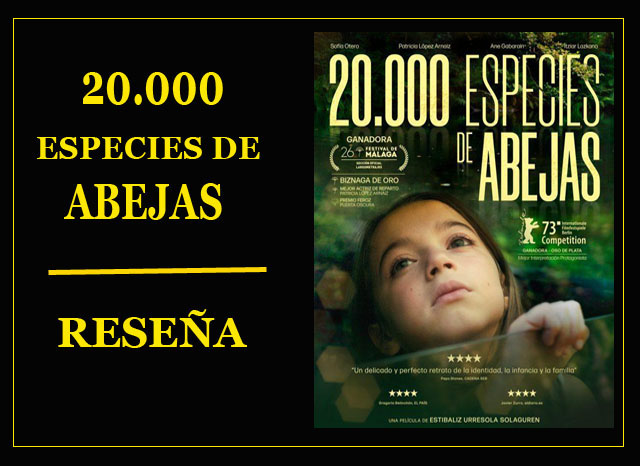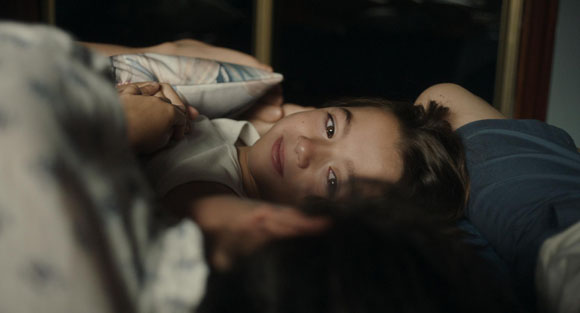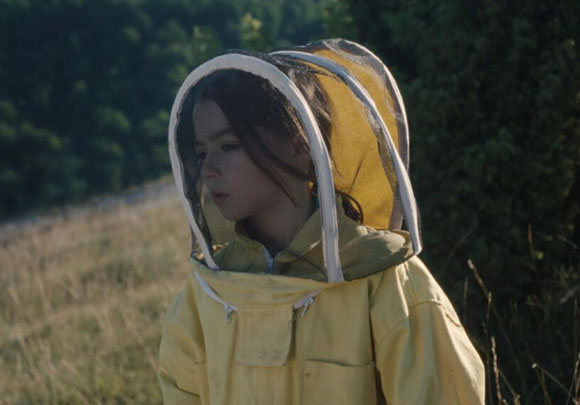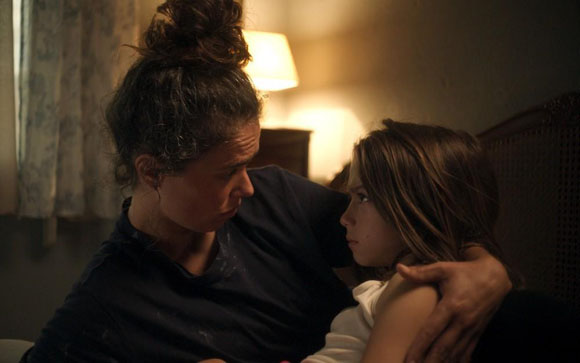20.000 especies de abejas | Reseña | Review

Hay preguntas fundamentales que nos han acompañado desde el inicio de los tiempos… Por ejemplo…¿Qué soy…? ¿Quién soy…? Tienen que ver con nuestra identidad, con los cimientos de lo que somos. En las respuestas que damos a ellas nos descubrimos como pertenecientes a una comunidad humana, podemos decir soy esto o aquello. Pero a veces la respuesta se complica y el descubrimiento de la identidad se vuelve un tortuoso camino…
La directora y guionista española Estibaliz Urresola Solaguren, nos deja en 20.000 especies de abejas (2023) una película profundamente dramática sobre un conflicto de identidad.
Aitor (Sofía Otero), nuestro personaje principal, es un niño de ocho años que vive una gran incertidumbre. Su anatomía es masculina pero él no se siente como tal, está convencido que es una niña.
El pequeño vive sumido en la confusión, no entiende lo que pasa. Intuye que hay algún tipo de error, que lo han puesto en el cuerpo equivocado, y por eso la discrepancia entre lo que revela su cuerpo y lo que siente su corazón…
Aún cuando tiene el apoyo de la madre su existencia es difícil. El entorno no termina de aceptarlo y su vida se desenvuelve en un ambiente de gran tensión. Detalles cotidianos como ir a la piscina son motivos de angustia, le avergüenza ponerse el traje de baño que no es, le avergüenza no ir al baño de los varones… Le avergüenza que lo llamen Aitor…
Hay momentos en los que el niño se siente profundamente desesperado, incomprendido, frustrado…Y en su imaginación infantil su anhelo más grande es que se cumpla algún tipo de milagro que haga que los demás también puedan verlo, tratarlo y aceptarlo como una niña…Dejar atrás a Aitor y seguir siendo Lucía…

Me gustó mucho el tono de la película. Escapa a la tentación de meternos en largas disquisiciones de tipo sociológico, psicológico o de otro tipo para explicar la situación de Aitor.
Sí hay un momento en que la abuela materna echa mano al cliché de que todo lo que pasa con el niño es consecuencia del impacto de las redes sociales, el internet, o la falta de mano dura de sus padres…
Pero este comentario se queda allí como un poco intrascendente, como en el aire… Y tiene que ver más con otro tipo de conflictos, el de las madres que se sienten decepcionadas por las hijas.
Y es que Lita (Itziar Lazkano Setién) la abuela materna de Aitor se siente muy decepcionada con Ane (Patricia López Arnáiz), su hija. Y la situación del nieto solo añade más elementos al dossier de críticas y descalificaciones que le lleva a la hija. A estas dos les cuesta soportarse…
En lo que si pone el foco la película es en cuestionar nuestro concepto de “normalidad”. Para bien y para mal todos hemos sido criados atendiendo a ciertos patrones, con ellos hacemos la vida, con ellos nos sentimos cómodos, con ellos nos sentimos seguros. Cuando algo se sale del patrón la sorpresa se apodera de nosotros y no sabemos cómo responder.

Es lo que pasa con Aitor, su familia proviene de un medio bastante conservador del Norte de España, donde los roles masculinos y femeninos están muy bien definidos. No es nada común que un niño de pronto comience a cuestionar su nombre, a pedir que no lo llamen de otro modo, y a nombrarse a sí mismo con el género femenino.
En tales circunstancias es comprensible que la primera respuesta de la familia sea la incertidumbre, no saber qué hacer, no saber cómo responder, lo que abre las puertas al conflicto, porque siempre habrá unos más comprensivos que otros...
Pero la etapa de la sorpresa tiene un límite y hay que encarar la situación, plantearse en serio qué respuesta se va a dar. En casos como este lo único sensato es la aceptación, sin buscar razones que quizá sean difíciles de comprender.
Lo otro es caer en el mal mayor, hacerle la vida imposible al niño, someterlo a situaciones de represión que nunca le harán cambiar lo que siente. Actuando de este modo lo único que se logra es poner al niño al borde de un abismo donde se compromete hasta su vida.
Se trata entonces de entender que la “normalidad” puede ser un estorbo para seguir adelante…

Entre las cosas que destaco de la película están las actuaciones. La niña Sofía Otero, a su corta edad, se revela como una gran actriz. Probablemente será de esos niños genios que luego hacen grandes carreras. Su papel de Aitor-Lucía es más que convincente. Hay escenas donde logra darle una gran fuerza al personaje.
También estuvo muy bien Patricia López Arnáiz. Su interpretación de Ane nos mete en la piel de una mujer fuerte que busca la manera de abrirse camino para apoyar a su hijo.
Otra actuación que destaco es la de Ane Gabarain, quien interpreta a la tía abuela Lourdes. Ella es una mujer de campo dedicada a la cría de abejas. Es la que más se acerca a Aitor y establece con él-ella una gran empatía. Son muchas las situaciones en que aprovecha su labor de apicultura para iniciar al pequeño en la historia familiar y para dejarle importantes lecciones de vida.
20.000 especies de abeja es una película muy recomendable, de esas que nos ponen a pensar, de las que nos invitan a ser más sensibles y comprensivos. Si tienen la oportunidad denle un visionado…
Gracias por tu tiempo.
Fuente de imágenes. I II III IV


There are fundamental questions that have accompanied us since the beginning of time... For example... What am I...? Who am I...? They have to do with our identity, with the foundations of who we are. In the answers we give to them we discover ourselves as belonging to a human community, we can say I am this or that. But sometimes the answer becomes complicated and the discovery of identity turns into a tortuous path...
The Spanish director and screenwriter Estibaliz Urresola Solaguren, leaves us in 20,000 species of bees (2023) a deeply dramatic film about a conflict of identity.
Aitor (Sofía Otero), our main character, is an eight-year-old boy who lives a great uncertainty. His anatomy is male but he does not feel like one, he is convinced that he is a girl.
The little boy lives in confusion, he does not understand what is going on. He senses that there is some kind of mistake, that he has been put in the wrong body, and that is the reason for the discrepancy between what his body reveals and what his heart feel...
Even when he has the support of his mother, his existence is difficult. His environment does not quite accept him and his life unfolds in an atmosphere of great tension. Everyday details such as going to the swimming pool are reasons for anguish, he is ashamed to wear the bathing suit he is not wearing, he is ashamed not to go to the boys' bath... He is ashamed to be called Aitor...
There are moments when the boy feels deeply desperate, misunderstood, frustrated...And in his childish imagination his greatest longing is for some kind of miracle to be fulfilled that will make others also be able to see him, treat him and accept him as a girl...To leave Aitor behind and remain Lucia...

I really liked the tone of the film. It escapes the temptation to get into long sociological, psychological or other disquisitions to explain Aitor's situation.
There is a moment in which the maternal grandmother throws out the cliché that everything that happens to the child is a consequence of the impact of social networks, the internet, or the lack of a firm hand from his parents...
But this comment remains there as a bit inconsequential, as if in the air... And it has more to do with another type of conflict, that of mothers who feel disappointed by their daughters.
Lita (Itziar Lazkano Setién), Aitor's maternal grandmother, feels very disappointed with Ane (Patricia López Arnáiz), her daughter. And the grandson's situation only adds more elements to the dossier of criticisms and disqualifications she brings to her daughter. These two find it hard to stand each other...
What the film does focus on is questioning our concept of "normality". For better or for worse, we have all been raised according to certain patterns, with them we live our lives, with them we feel comfortable, with them we feel safe. When something is out of the pattern, surprise takes over us and we do not know how to respond.
This is what happens with Aitor, his family comes from a very conservative environment in the North of Spain, where male and female roles are very well defined. It is not at all common for a boy to suddenly begin to question his name, to ask not to be called anything else, and to name himself with the feminine gender.

In such circumstances it is understandable that the first response of the family is uncertainty, not knowing what to do, not knowing how to respond, which opens the door to conflict, because there will always be some more understanding than others...
But the stage of surprise has a limit and it is necessary to face the situation, to seriously consider what response is going to be given. In cases like this the only sensible thing to do is to accept, without looking for reasons that may be difficult to understand.
The other is to fall into the greater evil, to make life impossible for the child, to subject him/her to situations of repression that will never make him/her change what he/she feels. Acting in this way, the only thing that is achieved is to put the child on the edge of an abyss where even his life is compromised.
It is then a matter of understanding that "normality" can be a hindrance to moving forward...

Among the things that stand out in the film are the performances. The girl Sofia Otero, at her young age, reveals herself as a great actress. She will probably be one of those child geniuses who later make great careers. Her role as Aitor-Lucía is more than convincing. There are scenes where she manages to give great strength to the character.
Patricia López Arnáiz was also very good. Her interpretation of Ane puts us in the skin of a strong woman who looks for a way to make her way to support her son.
Another performance that stands out is that of Ane Gabarain, who plays great-aunt Lourdes. She is a country woman dedicated to raising bees. She is the one who gets closer to Aitor and establishes a great empathy with him. There are many situations in which she takes advantage of her beekeeping work to initiate the little boy in the family history and to leave him important life lessons.
20,000 species of bees is a highly recommended film, one of those that make us think, one of those that invite us to be more sensitive and understanding. If you have the opportunity, give it a viewing...
Thank you for your time.
Translated with www.DeepL.com/Translator (free version)








Comunidad Be Entrepreneur

Hola, me detuve a leer tu reseña porque me llamo la atención el nombre de esta película y al leer tu opinión sobre ella y contarnos de lo que trata me dieron muchas ganas de verla. Se ve un film conmovedor, además toca un tema muy necesario. Es de esas películas que sin dudas te dejan reflexionando y sería bueno que todos las veamos para comprender mejor este tipo de situación.
Muy buena recomendación, un saludo!
Sí, la película motiva muchas reflexiones sobre un tema que a veces no se comenta. Muchas gracias por pasar y comentar estimada @erigm. Feliz año. Un fuerte abrazo desde Maracay.
Hola @irvinc, hace tres meses he intentado verla, pero no encuentra plataforma de streaming dónde la tengan en cartelera. Dónde la vio usted?.
Saludos. Yo la conseguí en un torrent. Ojalá la puedas ver. Muchas gracias por pasar y comentar estimada @atreyuserver. Feliz año. Un fuerte abrazo desde Maracay.